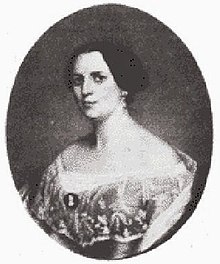Maria Antonovna Corsini
Marija Antonovna Corsini , born Maria Antonovna Bystroglasowa , ( Russian Мария Антоновна Корсини , maiden name Russian Мария Антоновна Быстроглазова * December 25, 1814 . Jul / 6. January 1815 greg. In Vyatka , † February 11 jul. / 23. February 1859 greg . in St. Petersburg ) was a Russian writer and translator .
Life
Marija Antonovna was the daughter of the court councilor (7th class ) AF Bystroglasow and granddaughter of the businessman SJ Maschkowzew. From 1826 to 1832 she attended the Ekaterininsky Institute for Noble Girls in St. Petersburg on the Fontanka (built by Giacomo Quarenghi at the instigation of Empress Maria Fjodorovna ). In 1837 she married the architect Geronimo Corsini in the church of the Ekaterininsky Institute .
1839-1840 Marija Corsini traveled with her husband in Western Europe . In Paris she met Adam Mickiewicz . After returning to St. Petersburg, she introduced the literary Thursday evening in her home . Among the visitors and friends were Pyotr Alexandrowitsch Pletnjow , Vladimir Fyodorowitsch Odojewski and Alexandra Ossipovna Ischimowa , in whose magazines Corsini published. Corsini translated Mickiewicz's sonnets . She later wrote articles for teenagers on parenting issues. Her first anthology with thoughts and stories about youth appeared in 1846. Her main work was her essays on modern life in 9 volumes. Jakow Karlowitsch Grot did not appreciate Corsini's literary work and found her comedies terrible.
Corsini had a son Pavel (1839-1896), who studied at the law faculty of the University of St. Petersburg and became a forester , and two daughters Ekaterina (1838-1911) and Natalja (1841-after 1913), whom she did not enter the Ekaterininsky -Institute, but educated according to their own methods, so that they were the first women to attend lectures at St. Petersburg University. Ekaterina became an artist and married the literary historian Pavel Alexandrovich Wiskowatow . Natalja became a writer, took part in student unrest in 1861 and married the revolutionary Nikolai Issaakowitsch Utin in 1863 .
Corsini was buried in the Lutheran section of the Volkovo Cemetery. Her former teacher Alexander Wassiljewitsch Nikitenko dedicated an honorable obituary to her .
Web links
- Catalog of the Russian National Library : Корсини, Мария Антоновна
Individual evidence
- ↑ a b c Корсини (Мария Антоновна, урожд. Быстроглазова) . In: Brockhaus-Efron . tape XVI , 1895, p. 346 ( Wikisource [accessed December 11, 2019]).
- ↑ Н. С. Карцов: Несколько фактов из жизни Санкт-Петербургского училища Ордена Св. Екатерины . St. Petersbur 1898, p. 56 .
- ↑ MA Corsini: Мысли и повести, посвященные юношеству . St. Petersburg 1846.
- ↑ MA Corsini: Очерки современной жизни . 2nd Edition. St. Petersburg 1853.
- ↑ Переписка Я. К. Грота с П. А. Плетневым. Том 2 . St. Petersburg 1896, p. 529 .
- ↑ Переписка Я. К. Грота с П. А. Плетневым. Том 3 . St. Petersburg 1896, p. 561 .
- ↑ Корсини в Петербурге (accessed December 11, 2019).
- ↑ Некролог . In: Иллюстрация . No. 58 , 1859, pp. 126 .
- ↑ А. В. Никитенко: Дневник: 1858–1865 . Гос. изд-во худож. лит-ры, Moscow 1955, p. 62 .
| personal data | |
|---|---|
| SURNAME | Corsini, Marija Antonovna |
| ALTERNATIVE NAMES | Bystroglasowa, Marija Antonovna (maiden name); Корсини, Мария Антоновна; Быстроглазова, Мария Антоновна (Russian) |
| BRIEF DESCRIPTION | Russian translator and writer |
| DATE OF BIRTH | January 6, 1815 |
| PLACE OF BIRTH | Vyatka |
| DATE OF DEATH | February 23, 1859 |
| Place of death | St. Petersburg |
